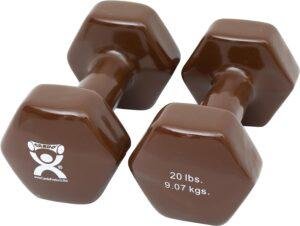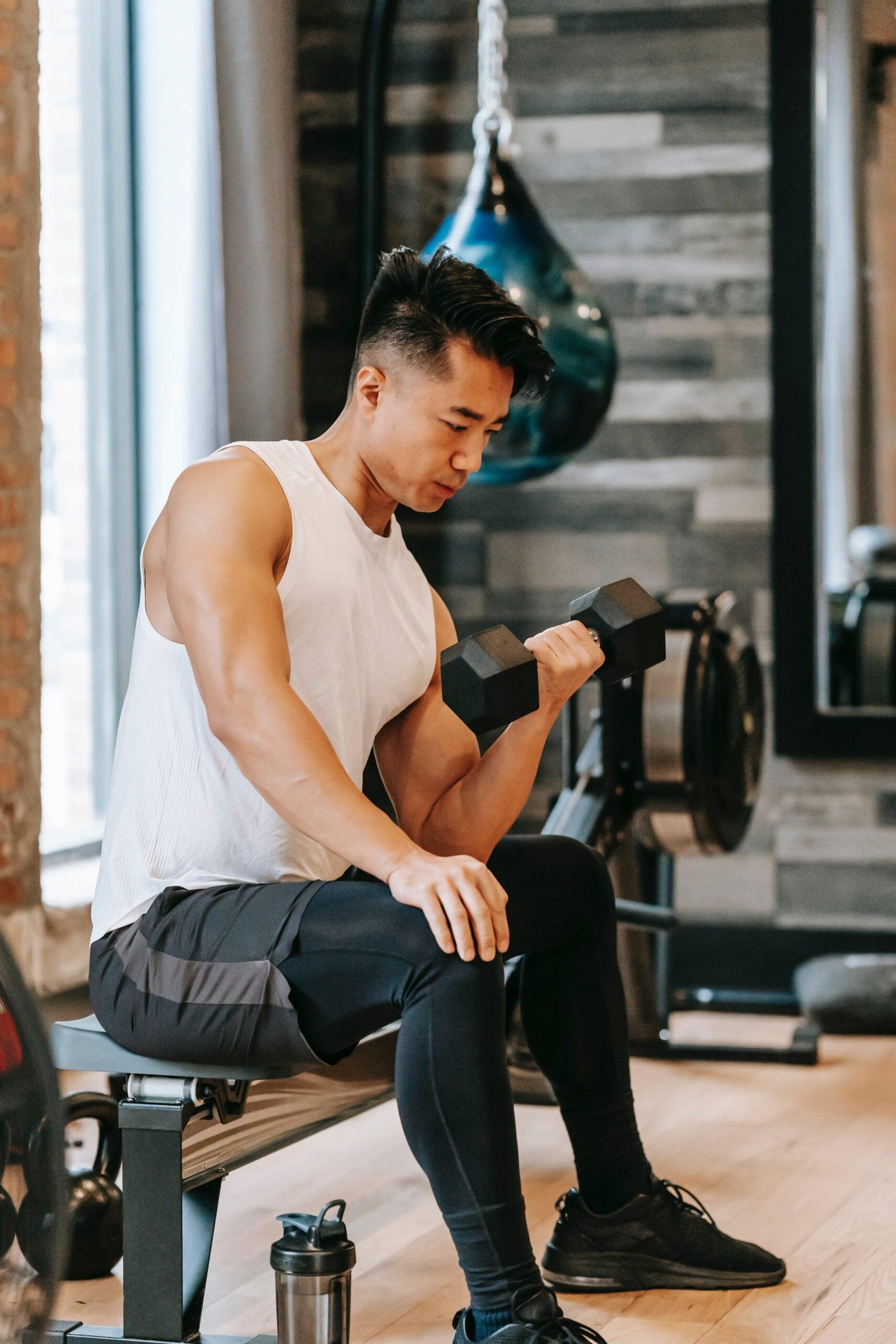Fitness tips for daily routine for beginners?:Tips for Beginners

Here are some Fitness tips for daily routine for beginners:
Set Realistic Goals: Start with achievable fitness goals. Creating modest, attainable objectives will help you stay motivated.
Find an Activity You Enjoy: Whether it’s walking, dancing, biking, or yoga, choose an activity you really enjoy. This will make it easier for you to follow your daily routine.
Start Slowly: Don’t rush into an intense workout. Start with short, low-intensity sessions to avoid injuries and overexertion.
Consistency is key: Instead of aiming for intensity, go for regularity. Even a short daily workout is more beneficial than sporadic intense sessions.
Stay Hydrated: Drinking enough water is important for your overall health and energy levels. Hydration helps muscle function and recovery.
Balanced Diet: Include a whole-food diet with plenty of fruits, vegetables, lean proteins, and whole grains. Proper nutrition complements your fitness efforts.
Get Enough Sleep: Recovery and rest are equally as vital as physical activity. Make sure you get enough sleep so your body can recover and get stronger.
Warm-Up and Cool-Down: Before and after each workout, perform warm-up and cool-down exercises to prevent injury and reduce muscle soreness.
Listen to Your Body: Observe the sensations in your body. If you experience more pain than normal muscle soreness, it is important to rest and seek medical attention if necessary.
Be responsible: Consider exercising with a friend, joining an exercise class, or using exercise apps to stay on track and motivated.
Track Your Progress: Keep track of your workouts, measurements or weight changes to track your progress and stay motivated.
Consult a Professional: If you have any pre-existing medical conditions or concerns, consult a doctor or fitness professional before beginning a new exercise regimen.
Remain Upbeat: Having a positive outlook can have a big impact. Have faith in yourself and your ability to make healthy changes in your life.
Variety is the Key: Don’t always follow the same routine. Vary your workouts to avoid boredom and challenge different muscle groups.
Patience: It takes time to get results. Try not to lose hope if you don’t notice results right away. Remain firm and patient.
Remember, the most important thing is to make fitness part of your daily life. Start small, be consistent, and gradually build up your routine. Your journey to a healthy lifestyle is a marathon, not a sprint.
How should a beginner start working out everyday?

Starting a daily exercise routine as a beginner can be a great way to improve your fitness and overall health. Here’s a step-by-step guide on how to get started:
Consult a Health Care Professional: Before starting any exercise program, it is advisable to consult a health care professional, especially if you have any pre-existing medical conditions or concerns. They can offer you advice based on your particular requirements.
Set Clear Goals: Define what you want to achieve from your daily workout. Whether it’s losing weight, gaining strength, increasing flexibility or improving overall health, having clear goals will help you stay motivated.
Choose an Activity You Enjoy: Choose an exercise you really enjoy. It could be walking, jogging, cycling, swimming, dancing, yoga or anything that keeps you engaged and motivated.
Start Slow: If you’re new to regular exercise, start with small, manageable workouts. 15-30 minutes a day is a good starting point. The length and intensity should be gradually increased as you become more comfortable.
Create a Schedule: Set a specific time for your daily workout. Consistency is important, so creating a routine will help make exercise a habit.
Warm Up and Cool Down: Take a few minutes to warm up and cool down before and after each workout. This helps prevent injuries and reduce muscle pain.
Use proper form: When exercising, pay attention to your form to avoid injury. If you’re unsure, consider working with a fitness professional or using instructional videos as a guide.
Start with Bodyweight Exercises: Bodyweight exercises like squats, push-ups, and planks are great for beginners. They require no equipment and can help you build strength and endurance.
Progress Gradually: As you become more comfortable with your routine, gradually add new exercises or increase the intensity. This can be done by incorporating weights, resistance bands, or trying more challenging exercise variations.
Keep Yourself Hydrated: you stay hydrated, be sure you drink lots of water prior to, during, and after your workout. Recuperation and performance might be impacted by dehydration.
Listen to Your Body: If you’re experiencing more pain or discomfort than normal muscle pain, it’s important to rest and allow your body to heal. Overcoming pain can lead to injury.
Rest and Recovery: Make sure you get enough sleep, as it is during rest that your body repairs and strengthens. Rest days are also important to prevent burnout and overtraining.
Track Your Progress: Keep an exercise journal to record your exercises, sets, and repetitions. This will help you keep track of your progress and make necessary adjustments to your routine.
Get Help: Consider exercising with a friend or joining an exercise class. Having a training partner can provide motivation and accountability.
Stay positive: Maintain a positive attitude and celebrate your accomplishments, no matter how small. A positive mindset can help you stay committed to your daily exercise routine.
Remember that consistency is key when starting a daily exercise routine. It is better to start slowly and progress gradually rather than putting too much pressure on yourself and risking exhaustion or injury. Listen to your body, be patient and enjoy the journey to better health and fitness.
How can I improve my fitness?

Improving your fitness is a worthwhile goal, and there are several key principles to keep in mind as you work toward it. To effectively improve your fitness:
Set Clear Goals: Define what you want to achieve. Having specific, measurable goals will give you direction and motivation. For example, your goal might be to run a certain distance, lift a certain weight, or reduce your body fat percentage.
Pick Pastimes You Love to Do: Look for physical pursuits that you enjoy. This can be traditional workouts such as running, bicycling, or weight lifting, or more recreational activities such as dancing, hiking, or playing a sport. Enjoyment will keep you engaged and committed.
Create a Balanced Routine: A complete fitness routine should include cardiovascular exercise (using weights and exercises) (yoga or stretching). This ensures that you focus on all aspects of fitness.
Gradually Increase Intensity: To see progress, you need to challenge your body. Gradually increase the intensity, duration or resistance of your workout. For example, you can add more weight, run longer distances, or increase the intensity of your cardio sessions over time.
Mix Up Your Workout: Avoid monotony by incorporating variety into your routine. Try different exercises, poses and fitness classes to avoid boredom and target different muscle groups.
Prioritizing Proper Nutrition: A balanced diet is important to promote recovery. Give priority to whole foods, such as an abundance of fruits, vegetables, lean meats, and whole grains. Drink plenty of water and consult a professional.
Get Adequate Rest: Adequate sleep and rest days are essential for recovery and muscle growth. Aim for 7-9 hours of quality sleep per night and schedule regular rest days to avoid overtraining.
Stay Hydrated: Proper hydration is vital for your energy levels and overall health. Make sure to stay hydrated before, during, and after your exercise.
Monitor Your Progress: Keep records of your workouts, measurements or other relevant data. Tracking your progress will help you see how far you’ve come and make any necessary adjustments to your routine.
Listen to Your Body: Be aware of the sensations in your body. If you experience more pain or discomfort than normal muscle pain, take it as a sign to rest and recover. Ignoring pain can lead to injury.
Consider Professional Guidance: If you’re new to exercising or want to take your fitness to the next level, consider working with a personal trainer, coach or fitness professional. They can provide personal guidance and inspiration.
Stay Positive and Patient: Improving fitness is a journey that takes time. Stay positive, celebrate your achievements and don’t get discouraged by failures. Consistency is key.
Description: Share a workout with a friend, or join a fitness class or group. Accountability can help you stay on track.
Recovery Techniques: Explore recovery techniques like foam rolling, massage and mobility exercises to improve your muscle recovery and prevent stiffness.
Consult a Healthcare Professional: If you have innervations, it is recommended to consult a health care professional to make sure your fitness plan is safe and appropriate for your specific situation.
Improving your fitness is a journey that requires dedication and patience. Keep in mind that progress can sometimes be slow, but with consistency and the right approach, you can achieve your fitness goals and enjoy the many benefits of a healthier, more active lifestyle.
How to gain muscle?

Gaining muscle involves a combination of targeted exercise, proper nutrition, and adequate rest. Here is a guide that will help you build muscle effectively:
Strength Training:
- Resistance training: Perform strength training exercises, such as weight lifting, bodyweight exercises, or resistance band workouts. Compound exercises such as squats, deadlifts, bench presses, and pull-ups are effective for building muscle.
Increasing Stress:
- Increase the resistance or weight you raise gradually.This progressive overload stimulates muscle growth by challenging the muscles to adapt to heavier loads.
Work all Major Muscle Groups:
- Make sure your strength training routine targets all major muscle groups, including the chest, back, legs, shoulders, and arms. A balanced development is necessary.
Proper Way:
- Maintain proper form during exercise to maximize muscle activation and minimize risk of injury. Consider working with an instructor to learn proper technique.
Frequency:
- Try to follow a regular training schedule, such as 3 to 5 times a week, to provide constant stimulation to your muscles.
Volume:
- Perform several sets (usually 3-5) of each exercise, with a moderate number of repetitions (8-12) per set. This combination of volume and intensity is effective for muscle growth.
Nutrition:
- Eat a protein-rich diet to aid muscle repair and growth. Aim for lean protein sources like chicken, fish, lean meat, tofu, beans, and dairy products.
Calorie Surplus:
- To gain muscle, you need to consume more calories than your body burns (a calorie surplus). However, make sure that the excess is controlled and that the excess fat does not increase.
Carbohydrates and Fats:
- Carbohydrates provide energy for workouts and healthy fats support overall health. Include a balanced mix of carbohydrates and fats in your diet.
Hydration:
- Adequate hydration is important for muscle function and recovery. Drink enough water throughout the day.
Post-workout nutrition:
- After exercising, eat a combination of protein and carbohydrates to aid muscle recovery. Protein shakes or a balanced diet may be beneficial.
Rest and Recovery:
- Muscles grow during rest periods, so make sure you get enough sleep (7 to 9 hours a night) and incorporate rest days into your training program.
Supplement:
- While not necessary, some people choose to use protein supplements or creatine to aid in their muscle-building efforts. See a physician before beginning any new supplement regimen.
Stability:
- Building muscle is a gradual process that requires consistency. Follow your long-term training and nutrition plan.
Monitor Progress:
- Keep records of your workouts and track your muscle development. Adjust your routine and nutrition as needed based on your progress.
Reduces Stress:
- High levels of stress can hinder muscle growth. Include stress-reduction methods in your everyday practice, such as yoga, meditation, or deep breathing.
Consult a Professional:
- If you’re new to weightlifting or have specific fitness goals, consider working with a personal trainer or fitness expert who can tailor a program to your needs.
Remember that everyone’s body responds differently to training and nutrition, so it may take time to see significant increases in muscle mass. Be patient, stay committed, and maintain a balanced approach to achieve your muscle building goals safely and effectively.
FAQs
Q1: I am a complete newbie to fitness. Where should I start my daily routine?
A: Start with achievable goals and choose an activity you enjoy. Start slowly with short workouts and gradually increase the duration and intensity as you feel more comfortable.
Q2: How long should a daily workout be for beginners?
A: Daily workout for beginners can last for at least 15 to 30 minutes. The key is consistency. Even short, regular workouts are more beneficial than sporadic intense sessions.
Q3: What are some simple exercises I can do at home without any equipment?
A: Bodyweight exercises like squats, push-ups, planks and lunges are great options for beginners. These are simple, no-tech exercises you may perform at home.
Q4: Is it necessary to have a structured training plan for a beginner?
A: Although a structured plan can be helpful, it is not required. The most important thing is consistency in your workout and gradually increasing the challenge. You can develop a plan or seek guidance from a fitness professional.
Q5: How can I stay motivated to exercise every day as a beginner?
A: Find an exercise buddy, join a fitness class, or use fitness apps to stay motivated. Setting achievable goals and celebrating your progress can also help maintain motivation.
Q6: What is the best time of day to exercise for beginners?
A: The best time to exercise is when it suits your schedule and when you feel most energetic. Some people prefer to exercise in the morning, while others find it more convenient to exercise in the evening. The key is consistency.
Q7: How important is nutrition for beginners starting a daily exercise routine?
A: Proper nutrition is essential to achieving your fitness goals. A balanced diet of lean proteins, fruits, vegetables and whole grains supplements your exercise efforts and aids recovery.
Q8: What should I do if I feel pain during or after the initial workout?
A: Muscle pain is common, especially in beginners. However, if you experience severe pain or discomfort, it is essential that you rest and consult a health professional if necessary.
Q9: How often should I change my exercise routine as a beginner?
A: It’s a good idea to add variety to your workouts every few weeks to avoid boredom and challenge different muscle groups. However, consistency in your routine is also important.
Q10: Can I start daily workouts initially or should I include rest days?
A: Rest days are necessary for your body to recover and to avoid overtraining. As a beginner, it is advisable to include rest days in your routine and as your fitness level improves you can gradually increase the frequency.
Conclusion
In conclusion, embarking on a fitness journey as a beginner is a commendable decision that holds the potential to transform your health and well-being. The fitness tips for a daily routine outlined in this article provide a solid foundation for anyone taking their first steps towards a healthier lifestyle.
